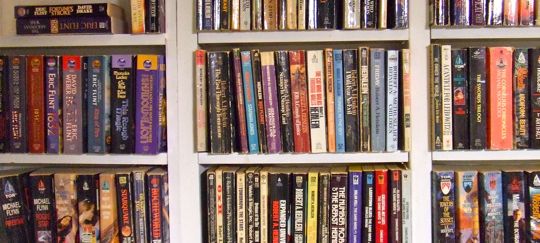
I was noticing something the other day whilst reading a book. I said to myself, “There are a lot of pages in this book.” I’ve been reading for while now, and I know about how big books are. So when I looked at this seemingly normal book and noticed that I was on page 500, I knew that something was up.
I went down to the basement and pulled several other similar sized books off the shelf (and one bigger and one smaller) and started to compare them. I almost immediately noticed that they all had pages. Then I noticed that one of them probably belongs to Brad and that I’ve had it since maybe high school.

Looking at those books, you’d probably imagine that the five in the middle are roughly the same size. Except now, with two paragraphs of build-up you’d probably imagine anything at all but. Well, here’s the data…
| Book | Year | Cost | Pages | Words | ¢ / kWords | in 2009 dollars |
| tEotW | 1990 | $6.99 | 814 | 320,000 | 2.2 | 3.1 |
| E | 2006 | $7.99 | 638 | 265,000 | 3.0 | 3.2 |
| tRotK | 1986 | $3.95 | 543 | 182,000 | 2.2 | 4.3 |
| M | 1984 | $3.50 | 358 | 142,000 | 2.5 | 5.1 |
| BA | 1983 | $2.95 | 327 | 121,000 | 2.4 | 5.3 |
| Mot5M | 1980 | $2.25 | 373 | 131,000 | 1.7 | 4.5 |
| BtH | 1948 | $0.75 | 158 | 78,000 | 1.0 | 8.6 |
So, what’s the point? There are probably lots of points you could make from that mess. Some of them might even be true. My point? I had no idea that you could make a page half as wide as another page. I mean, pages are already pretty thin. Do they just split them down the middle?
For years I’ve been watching the price of books go up. I started buying books my freshman year in high school, and my memory was that they typically cost between $1.95 and $2.25 each. Lately they cost more like $6.99 and up. It was starting to get my goat until I did the calculations for that last column. Adjusting for inflation, I’m actually paying quite a bit less per word. It sort of makes you feel sorry for authors.

I don’t even know what to do with old books anymore. I still have a couple of boxes of them in the basement. But when I get new ones, they end up all over my house. Maybe I should just burn them. Burning solves lots of problems.
You could probably compost them.
I have a ton of books too, and once every blue moon, I pack up a bag & give them to good will.
And I don’t think books are cheaper…at least not at B&N. I never find a book for $6.99. They’re all 12.99 & up…mostly up.
You should buy more cheap, paperback science fiction books. The only things cheaper are romance novels.
I would just like to point out that Lloyd is a Super. Duper. Dork. I love him, but honestly, who calculates cost per word?
It’s not cost per word. It’s cost per kiloWord. Cost per word was too ridiculously small to be taken seriously.
Oh, my bad, S.D.D.
I like to get my books from Borders. They send me coupons at least once a week, so I get 25% off or more. 🙂 Gotta love coupons!
Borders science fiction and fantasy books are no longer in alphabetical order by author. I refuse to shop there.
Dear Lloyd,
Because you apparently have an ample amount of free time, could you please come to my house and dust? And then vacuum (sorry about the wrinkly carpet), and then maybe work on touch up painting any walls that need it? And the carpets could use shampooing…
Many thanks,
Beth
Dear Beth,
I’ll be right over. Um, but I’m not very good. And, um, I’m invisible.
Lloyd
ILloyd, (I for invisible) what’s the word on the iPad? I have bing cashback waiting for something to spend…
I shouldn’t have to point this out to uber computer/math book nerd, but the cost per kword for stolen books is 0. That’s we some folks turn to a life of crime- that and not having to read posts about atomic paper splitting.
hehe….
What’s everybody doing up so early?
Early?? Sam is up ANYTHING but early! By the time Sam posted, I had been up for almost 1.5 hours. And he was LATE getting up. Now I know why he was no help this morning, he was too busy posting about stealing books and atomic paper splitting! Come to think of it, he automated gravatar looks a lot like I did this morning. 🙂
oops, HIS, not HE in the last sentence.
Although you can do a fair amount of analysis with this data, you should include words per page and cost per page. This would give you better idea of the material costs. But than again what are you paying for? The pages or the words?
So after asking my question, and looking back at your cost per word, does this mean that the words of today’s authors are worth less than in the past?
I didn’t actually count the words in each book. I took the number of pages * number of lines * characters per line / average English word length.
There are a number of assumptions in there.
Books? What are books?